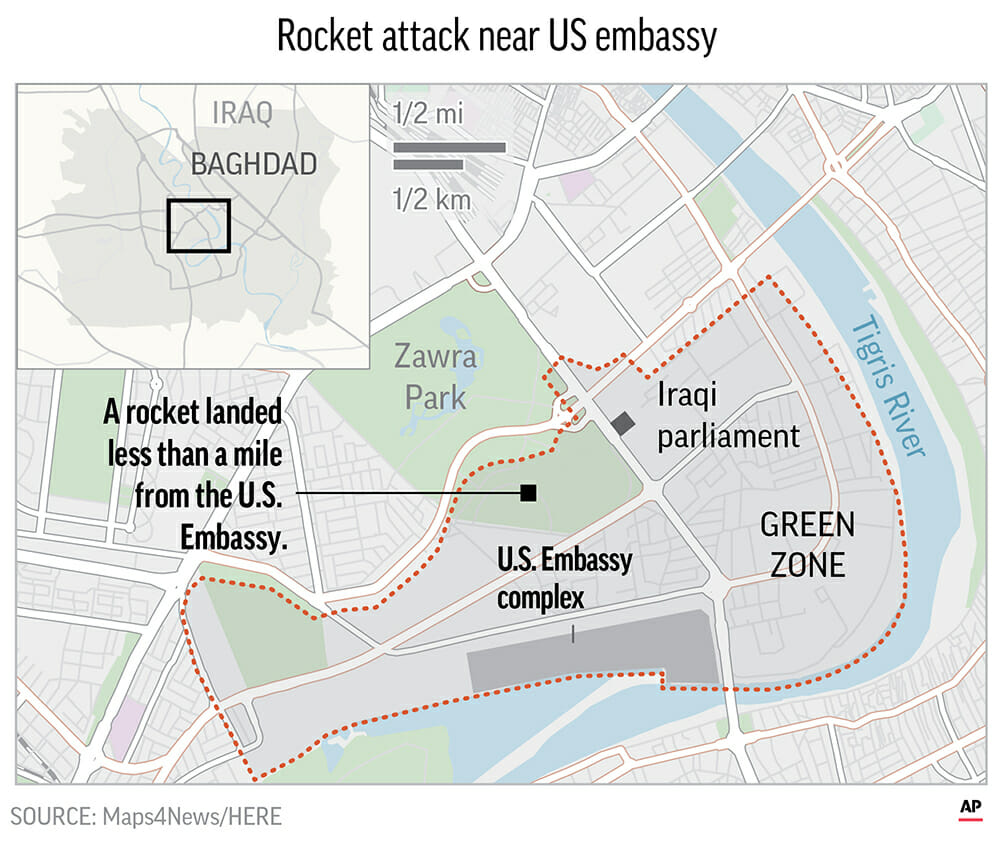
Iraqi Shiite figures warn US-Iran war could 'burn' Iraq
BAGHDAD (AP) — Leading Iraqi Shiite figures warned Monday against attempts to pull their country into a war between the U.S. and Iran, saying it would turn Iraq into a battlefield yet again, just as it is on the path to recovery.
The warning came hours after a rocket slammed into Baghdad’s heavily fortified Green Zone, landing less than a mile from the sprawling U.S. Embassy. No injuries were reported and no group immediately claimed the Sunday night attack.
Shortly after, President Donald Trump tweeted a warning to Iran not to threaten the United States or it will face its “official end.”
Last week, the U.S. ordered the evacuation of nonessential diplomatic staff from Iraq amid unspecified threats from Iran and rising tensions across the region. The White House has also sent warships and bombers to the Persian Gulf to counter the alleged Iranian threats.
Iraqi military spokesman Brig. Gen. Yahya Rasoul tweeted Monday that the army command in Baghdad is working “day and night” to guarantee the security of citizens, foreign missions and international and local companies.
On Monday, two influential Shiite clerics and a leading politician — all with close ties to Iran — warned that Iraq could once again get caught in the middle. The country hosts more than 5,000 U.S. troops, and is home to powerful Iranian-backed militias, some of whom want those U.S. forces to leave.
Populist Shiite cleric Muqtada al-Sadr said any political party that would drag Iraq in a U.S.-Iran war “would be the enemy of the Iraqi people.”
“This war would mark the end of Iraq,” the black-turbaned al-Sadr warned. “We need peace and reconstruction.”
The influential cleric’s statements were echoed by the Shiite militias, which appeared to distance themselves from Sunday’s attack.
Qais al-Khazali, the leader the Iranian-backed Asaib Ahl al-Haq, or League of the Righteous group, tweeted that he is opposed to operations that “give pretexts for war” and added that they would only “harm Iraq’s political, economic and security conditions.”
A spokesman for Kataib Hezbollah said the rocket attack was “unjustified” and suggested a third party was trying to provoke a war, citing Israel or Saudi Arabia.
For the Shiite-majority Iraq to be a theater for proxy wars is not new. It lies on the fault line between Shiite Iran and the mostly Sunni Arab world, led by powerhouse Saudi Arabia, and has long been the setting where Saudi-Iran rivalry for regional supremacy played out.
After America’s 2003 invasion of Iraq to oust dictator Saddam Hussein, American troops and Iranian-backed militiamen fought pitched battles around the country, and scores of U.S. troops were killed or wounded by sophisticated Iranian-made weapons.
The office of Hadi al-Amiri, the leader of a coalition of Shiite paramilitary forces backed by both Baghdad and Tehran, released a statement calling on Iraqis to work together “to keep Iraq and the region away from war.”
“If war breaks out … it will burn everyone,” al-Amiri warned.
The Western Journal has not reviewed this Associated Press story prior to publication. Therefore, it may contain editorial bias or may in some other way not meet our normal editorial standards. It is provided to our readers as a service from The Western Journal.
Truth and Accuracy
We are committed to truth and accuracy in all of our journalism. Read our editorial standards.
Advertise with The Western Journal and reach millions of highly engaged readers, while supporting our work. Advertise Today.












